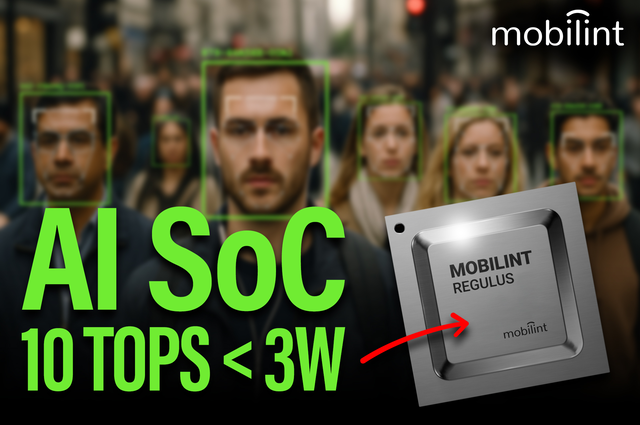Products
Solutions
Published
20 August 2025
Written by Luke Forster
Mobilint, a semiconductor company based in Korea, has introduced the Regulus NPU, a Processor designed to deliver 10 TOPS at just 3 watts. This device is built for the growing demand in Edge AI, meeting performance needs without relying on cloud compute or high power consumption.
Balancing performance and efficiency
The Mobilint Regulus chip is optimised for vision-based ML workloads, running models such as YOLO v8/v9 and MobileNet with minimal latency. Mobilint has validated the platform with over 300 models, and engineers can also bring their own trained networks using PyTorch, TensorFlow, or ONNX. The QB SDK, developed in-house, includes a compiler that manages quantisation, optimisation, and binary conversion into a Regulus-ready format. This enables direct deployment to hardware without disrupting existing pipelines.
Eco-friendly AI deployment
Power efficiency is a critical differentiator for Mobilint. By achieving 10 TOPS at 3W, the Regulus chip enables advanced AI in Drones, Medical devices, and other systems that operate with strict energy and thermal constraints. Reducing reliance on cloud infrastructure not only decreases latency but also lowers carbon emissions from data centre use. With billions of devices expected to integrate AI, solutions like Regulus provide a scalable, low power path forward.
Developer-friendly design
Mobilint has built the Regulus platform with developers in mind. The Yocto-based Linux environment includes a full board support package, drivers, and support for interfaces like MIPI CSI/DSI, Ethernet, USB, ISP, and audio codecs. Demonstrations show multiple models—object detection, pose estimation, and face recognition—running simultaneously on a single chip. This makes the Mobilint Regulus suitable for Consumer electronics as well as Industrial inspection systems.
A roadmap to the future of NPUs
While the current focus is on CNN-based vision, Mobilint is preparing upgrades that will extend the Regulus platform to transformer-based models and LLMs. This means future devices could handle natural language processing and multimodal reasoning directly at the edge. NPUs are becoming a standard AI-Native Solution for embedded computing, much like GPUs transformed visual workloads a decade ago.
The Mobilint Regulus provides engineers with a compelling, eco-efficient option for embedded AI inference. Its balance of capability, sustainability, and developer support positions it as a key technology in driving the next generation of intelligent edge devices.
Comments are closed.

Comments
No comments yet